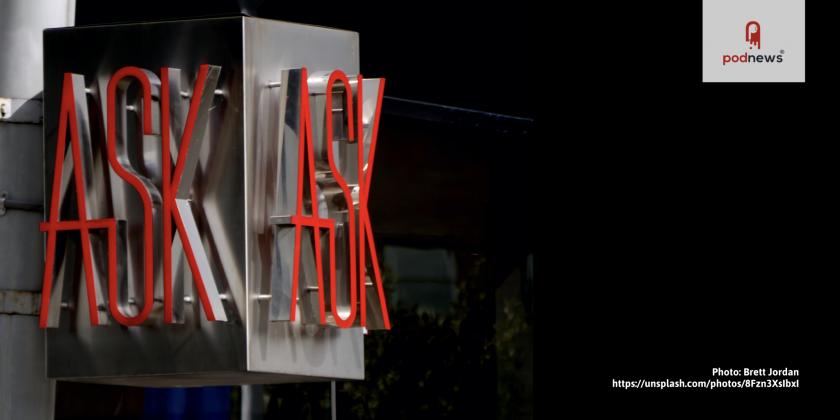
In podcasting too, consent isn't optional

This article is at least a year old
There is no doubt that podcasting is now a very different beast than it was in 2005, when Steve Jobs introduced it to iTunes. Today, new platforms, services and apps are trying to generate growth in order to get a pie of the ever-growing global listenership.
However, in their quest to reach a viable size, some of these businesses are endangering the strange and potentially fragile equilibrium between the listeners, the creators, and the apps that are connecting them.
The Three Categories of Podcast Apps
For many years, iTunes has been the most used podcast app, setting a positive standard for the whole industry. Simultaneously, three categories of apps and platforms slowly emerged, year after year, to form the diverse ecosystem we now know.
One crucial thing Apple did 15 years ago was to let podcasting be its own thing. Listeners could either browse the Podcast section of the iTunes Store to discover new shows, or get them from elsewhere by manually adding RSS feeds to the app. In essence, Apple decided not to control the RSS feeds that listeners could subscribe to. This simple decision turned out to be a big contributor to the openness of the podcasting ecosystem — the ability for anyone to create any show that is listenable in any app.
When it came to adding a podcast to Apple’s own directory, the conditions were — and still are — very clear: Apple did not host any content, but simply listed the episodes contained in the podcasters’ RSS feeds. Upon submitting their podcast, a contract was signed by clicking “Agree”, laying down explicit terms between Apple and the creator. From — and in reaction to — this model created by Apple, three categories of podcast apps gradually appeared.
The first category of apps is “iTunes-like”: they manage their own bespoke directory, to which podcasters have to intentionally submit their content by signing a digital contract. Through this, the podcaster gives direct and explicit consent.
The second category is made of apps scrubbing Apple’s very own directory to power a “search” feature, allowing podcasts to appear in the results without needing their creators to submit their feed to the app. Here, things are operating under a situation I describe as “customary consent”: by submitting an RSS feed to Apple, podcasters are inexplicitly consenting to their feeds appearing on other apps that operate similarly, and in a fair and transparent manner.
The third category is a bit more problematic.
Consent vs. Exploitation: The Third Category
From afar, nothing differentiates the third-category from the second: both are using iTunes (or, today, Apple Podcasts) as a source for their directory. But this third-category is unique in that these apps change the fundamental features of a standard podcast app.
Some third-category apps only allow listeners to subscribe to RSS feeds that are from their own, vetted, directory. This means that listeners cannot manually add podcasts they wish to subscribe to if they are not listed in this tailored directory. Other third-category apps allow their users — not the creators — to suggest the feeds of missing podcasts to be added to the app’s vetted directory.
The problem with both of these approaches is that they diverge from the expected behaviour of a standard podcast app: therefore, the consent — be it direct or customary — of the podcast creator is lacking because it is a different system, operating under principles that are unclear.
My own podcasts have appeared on these third-category apps on numerous occasions and not once have I been informed that my content would be listed there. Their stance is often: “it’s on the internet, so we can do what we want with it.” While I customarily consent for my content to appear on second-category apps that operate similarly to Apple Podcasts, I do not do so for those apps that arbitrarily pick and choose podcasts for their listings, working in a more obscure manner.
On top of that, some third-category apps also sell their own content, on the very same app. It is not difficult to come to the conclusion that they created a podcast app to lure listeners in, with RSS feeds they have culled from the Apple Podcasts’ herd, as a means to then sell a subscription to their own, locked-down content. All the while not paying or informing podcasters that their content is being exploited to indirectly generate profit.
This is Abnormal
Let me be clear: I have absolutely no issue with developers of podcast apps making a living. Overcast, Castro and Pocket Casts — to name a few — are some of the best smartphone apps out there, and behave in a fair and transparent manner. I am glad that the people or teams behind them are able to get revenue from selling upgrades, new features, or integrating ads into their interface.
What irks me, however, is this growing trend of disrespect from certain platforms and apps towards podcast producers. These companies are not entering a new and empty space: podcasting has been around for more than 15 years, and podcasting apps — of the first and second category — have paved the way for a fair ecosystem, both for the listeners (allowing them freedom to listen to what they want) and the podcasters (allowing their content to be played in apps following the standard model).
Consent is paramount. By entering an agreement with Spotify or Apple Podcasts, podcasters are aware that they are creating a relationship with those companies, their libraries, and their rules. By consenting to the rules of these platforms, they are indirectly consenting to other platforms that follow the same rules. If they come to disagree with the way those companies are behaving, they can terminate their agreement, and cut ties with them.
Where is the consent in platforms and apps that operate using different rules and do not create explicit relationships, more importantly contracts, with the podcasters?
Consent ISN’T Optional
These disrespectful actors — ranging from tiny start-ups to quite big businesses — must understand that the availability of something on the internet does not mean it is theirs to use freely, without either direct or customary consent. Direct consent requires a formal contract or agreement. Customary consent requires the same fundamental podcast app features, without any ulterior motive.
There is no way around it: Consent ISN’T optional, even if some companies behave like it is.
Furthermore, podcasters should be wary of companies that aim to be an inescapable middleman between them and their listeners. Some of them claim the RSS standard (and, sometimes, the mp3 standard) is “obsolete”, or soon to be “a thing of the past”. Ironically, some of the apps built by these companies are not even up to date with recent mp3 and RSS innovations, such as mp3 chapters and RSS tags for seasons and episodes.
My take is simple: Consent ISN’T optional — let’s keep podcasting awesome and open, by building upon respect for the podcaster, and the listener.
Yann thanks Malika Jumbe for the editing of this article.

































































































